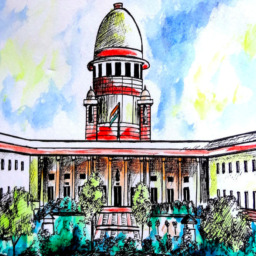What is Uniform Civil Code?
The provision of the Uniform Civil Code envisages a common and uniform civil law for the whole country. It was added as a Directive principles of state policy or DPSP and not as a fundamental right, which means that it’s not justifiable in the court of law. In 1948, when the constituent assembly was mooting to form the constitution of the country, the provision of UCC was taken up as the draft article 35 that led to a pandemonium in the assembly due to conflicting emotions. It was finally decided that it will be left as a DPSP and not as a fundamental right because the nation was not ready for such a drastic change, and found its place in the constitution as Article 44, which read, “Uniform civil code for the citizens The State shall endeavour to secure for the citizens a uniform civil code throughout the territory of India”.
Indian Context
Various Supreme court cases like Mohammad Ahmed Khan v. Shah Bano Begum, 1985; Sarla Mudgal v. Union of India, 1995, etc. emphasized on policy formation regarding the Uniform civil code to simplify the conduct of personal decisions in the country to weed out discrepancies, discrimination, and reduce litigation. India already has a common criminal code for the whole country which is followed uniformly and is codified in the Indian Penal code (IPC) and the Code of Criminal procedure (CrPC). India also has a civil code which is codified in the Code of civil procedure (CPC), but marriage, inheritance, adoption, and other ‘personal’ decisions were left out of the purview of the CPC that led to the formation of various personal laws and personal law boards like Hindu succession act, 1956; Hindu Adoptions and Maintenance Act, 1956; Muslim Personal Law (Shariat) Application Act, 1937; The Muslim women (protection on rights of divorce) act, 1986; Christian divorce act, 1869, etc. Some of these personal laws are discriminatory and biased towards women, e.g., Section 15 of the Hindu succession act, 1956 which was declared ultra vires and unconstitutional by the Bombay High court in the case of ‘Mamta Dinesh Vakil vs Bansi S. Wadhwa’ but is pending in the Supreme Court read as:
(1) “The property of a female Hindu dying intestate shall devolve according to the rules set out in section 16, —
(a) firstly, upon the sons and daughters (including the children of any pre-deceased son or daughter) and the husband;
(b) secondly, upon the heirs of the husband;
(c) thirdly, upon the mother and father;
(d) fourthly, upon the heirs of the father; and
(e) lastly, upon the heirs of the mother.
(2) Notwithstanding anything contained in sub-section (1), —
(a) any property inherited by a female Hindu from her father or mother shall devolve, in the absence of any son or daughter of the deceased (including the children of any pre-deceased son or daughter) not upon the other heirs referred to in sub-section (1) in the order specified therein, but upon the heirs of the father; and
(b) any property inherited by a female Hindu from her husband or her father-in-law shall devolve, in the absence of any son or daughter of the deceased (including the children of any pre-deceased son or daughter) not upon the other heirs referred to in sub-section (1) in the order specified therein, but upon the heirs of the husband.”
Muslim personal law (Shariat) allows men to marry four times, but women are not given the same right under the marriage jurisprudence that is scripturally based on Verse 3 of Surah 4 An-Nisa. Article 3 of the Decree of Gentile Hindu Usages and Customs of Goa, 1880 provides that a Hindu husband can take a second wife in the absence of an issue, if the wife has attained the age of 25, and also if she has attained age 30 without having a son.[1]
All India Muslim Personal Law Board (AIMPLB) has denied the acceptance of a Uniform Civil Code, they are content on following Shariat laws. Recently AIMPLB has suggested the Muslim community to not enter in any matrimonial tie-up with non-Muslims. The Board has said that marriage between Muslims and non-Muslims is “invalid” and “regretful”. Marriage between a Muslim and a non-Muslim was considered invalid even if it appeared to be valid by societal standards. “It is not considered legal as per the norms of Sharia,” said Maulana Rahmani while talking to media persons. [2] On the other hand, Khap Panchayats notoriously compel couples to marry within their religion and caste and sometimes resort to violent measures to do so. In a significant judgment, the Supreme Court in March 2018, held that any attempt by Khap Panchayats or any other assembly to scuttle or prevent two consenting adults from marrying is absolutely “illegal”. Any kind of torture or torment or ill-treatment in the name of honor that tantamount to atrophy of choice of an individual relating to love and marriage by any assembly, whatsoever nomenclature it assumes, is illegal and cannot be allowed a moment of existence. [3] The Supreme court in Vishwa Lochan Madan v UOI & Ors,2005 said that the practice of issuing ‘Fatwas’ and compelling people goes against the constitutional scheme of the country, the judgment noted, “The person or the body concerned may ignore it and it will not be necessary for anybody to challenge it before any court of law. It can simply be ignored. In case any person or body tries to impose it, their act would be illegal. A Qazi or Mufti has no authority or powers to impose his opinion and enforce his fatwa on anyone by any coercive method”. [4]
Is Uniform Civil Code a Panacea?
Goa’s civil code is an example of a discriminatory uniform civil code that is based on Portuguese references. Article 1204 of the Decree of Gentile Hindu Usages and Customs of Goa, 1880 permits the husband to get a divorce if adultery is committed by the wife, but the wife can get a separation only if the husband commits adultery with public scandal, and divorce if he keeps a mistress in the conjugal home or abandons her.; Article 1056 terms marriage a perpetual contract between persons of different sex rather than sacrament but same-sex marriage are not recognized under the jurisprudence. These are some of the provisions which should not be incorporated in the Uniform Civil Code of the country to make it more inclusive and just.
Conclusion
Everything indicates that we are in dire need of a Uniform Civil code to streamline marriage, adoption, and inheritance laws, but are we ready for it? The answer is not a straight one. While many endeavours for a Uniform Civil Code, might have some serious repercussions as it will lead to the dissolution of various personal laws which currently form the very basis of various personal activities. Dissolution might give rise to serious objections and haywire communities if done abruptly. A sudden decision can open doors to litigation and cases being filed, overwhelming our already overwhelmed judiciary under Right to religion laws i.e., Article 25 which is a fundamental right and is superior to DPSPSs i.e., Article 44. Other reservations concern the practicality of this policy decision in such a diverse country. 22nd Law Commission report said that the UCC is not desirable nor practical, and urged the legislature to “first consider equality within communities’ between men and women rather than equality between communities”. [5]
The central government should indulge in deliberations with various state governments and local representatives to carve out the best solutions according to the regional diversity and sentiments. As ‘personal laws’ is an item under 3rd list (concurrent list) in the 7th schedule and states are best apprised of regional needs, they should be given an upper hand in formulating these policies to preserve the delicately interwoven federal fabric of the country, and the centre should issue broad guidelines to streamline the process. So, the best solution is slow and gradual transfer with consensus and deliberations unlike other policy decisions taken nowadays. Before this metamorphosis of the Indian personal law system, there should be endeavours to achieve equality for women and the persecuted sects of the society which are the sole-bearers of these ill-designed and discriminatory personal laws. There’s an opportunity that should be seized but in a deliberate, diligent, and non-politicized manner.
Author(s) Name: Harsh Bansal (Rajiv Gandhi National University of Law, Patiala)
References:
[1] Faizan Mustafa, Explained: Why Goa’s Civil Code is not as uniform as it is made out to be, 20th April, 2021 7:41:46 am, https://indianexpress.com/article/explained/why-goas-civil-code-is-not-as-uniform-as-it-is-made-out-to-be-7279365/.
[2] Namita Bajpai, Inter-faith marriage illegal as per Sharia law: Muslim law board, 06th August 2021 06:15 PM, https://www.newindianexpress.com/nation/2021/aug/06/inter-faith-marriage-illegal-as-per-sharia-law-muslim-law-board-2341141.html.
[3] LIVELAW NEWS NETWORK, TOP STORIES Attempts By Khap Panchayats To Scuttle/Prevent Marriages “Illegal”: SC, 27th March 2018 12:13 PM, https://www.livelaw.in/attempts-khap-panchayats-scuttle-prevent-marriages-illegal-sc/.
[4] FP POLITICS, Not just Shariat courts: Supreme Court order also includes khap panchayats, 8th July, 2014 11:04 PM,https://www.firstpost.com/india/not-just-shariat-courts-supreme-court-order-also-includes-khap-panchayats-1608069.html
[5] Raghav Ohri, Uniform civil code neither necessary nor desirable: Law panel, 31thAugust, 2018, 11:24 PM, https://economictimes.indiatimes.com/news/politics-and-nation/uniform-civil-code-neither-necessary-nor-desirable-law-panel/articleshow/65627227.cms?from=mdr
















